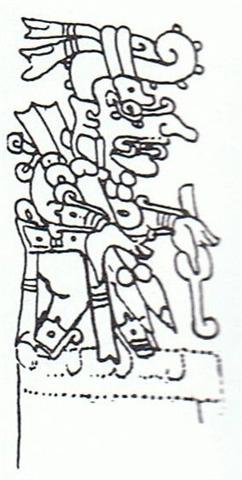3. On Hawaii the month Welo was in April, not at the time of winter solstice. The darkness inherent in the name Welo must rather have referred to how winter 'was killed'. My reflection makes me remember the tanist of Hercules: ... [Hercules] carries an oak-club, because the oak provides his beasts and his people with mast and because it attracts lightning more than any other tree. His symbols are the acorn; the rock-dove, which nests in oaks as well as in clefts of rocks; the mistletoe, or Loranthus; and the serpent. All these are sexual emblems. The dove was sacred to the Love-goddess of Greece and Syria; the serpent was the most ancient of phallic totem-beasts; the cupped acorn stood for the glans penis in both Greek and Latin; the mistletoe was an all-heal and its names viscus (Latin) and ixias (Greek) are connected with vis and ischus (strength) - probably because of the spermal viscosity of its berries, sperm being the vehicle of life. This Hercules is male leader of all orgiastic rites and has twelve archer companions, including his spear-armed twin, who is his tanist or deputy. He performs an annual green-wood marriage with a queen of the woods, a sort of Maid Marian. He is a mighty hunter and makes rain, when it is needed, by rattling an oak-club thunderously in a hollow oak and stirring a pool with an oak branch - alternatively, by rattling pebbles inside a sacred colocinth-gourd or, later, by rolling black meteoric stones inside a wooden chest - and so attracting thunderstorms by sympathetic magic ... Hercules had an oak-club but his tanist carried a spear. The one who is throwing a spear at the king is his opposite, his dark side personified. The Marquesan 10th lunar month Veo should indicate when a spear will hit its target and kill the king. If the 'king of darkness' is killed in spring by the advancing light, then there could be 2 'spear months', one corresponding to the time when the season of growth (e.g. Waxing Moon┤) is 'killed' and one to the time when the season of straw (e.g. Waning Moon) is 'speared'. South of the equator where Moon sets the rules there could be 2 spears. "In the island of Pukapuka Te Mango, the Shark, was applied to the long dark rift which divides the Milky Way from Scorpius to Cygnus. They declared that the 'shark of winter' had its head to the south and the 'shark of summer' had its head to the north, referring to the seasonal change in the position of the constellation. This, they said, was the monster which Maui speared and hurled high into the sky and they pointed out a small triangular patch of dark nebulosity near Scorpius as te tao, the spear with which Maui had performed his prodigious feat. In the Society Islands there were two distinct names for the rift, Vero-nu'u, Pierce-the-earth, and Vero-ra'i, Pierce-the-sky, the names of the two great wooden spears of Tane." (Makemson, a.a.) Tane (the god of trees and light) indeed had 2 spears:
The sky, ragi, is above and earth, nuku, is below, and Tane in between.
When the Rain God was in his mid-air station he carried 2 spears, but not 'under his arm, with the sharp end downwards' as the Hawaiian King, but with their blunt ends resting on his right shoulder::
|


